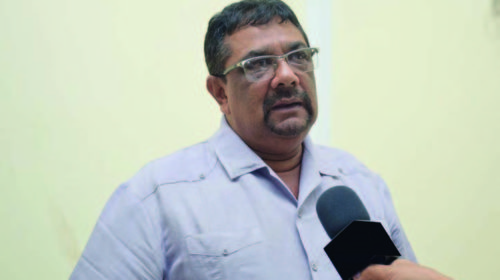
Rice is under threat in Region Six (East Berbice-Corentyne) if immediate measures not taken to provide water to farmers who operate in the 52-74 area and on the front lands along the Corentyne coast.
Regional Chairman David Armogan is blaming the Regional Executive Officer, Kim Williams-Stephens, for refusing to assist farmers even after President David Granger reached out to them.
Since November last year, the Region Six administration has been experiencing difficulty in terms of having enough money to purchase fuel for the pumps at Manarabisi and Black Bush Polder.
Regional Chairman David Armogan explained that the REO and the Superintendent of Works had since last year stated that there is enough money and that they had enough fuel for those pumps to last until the end of the year.
The two had anticipated that in January, funds would be released to buy fuel so that they can continue to pump water for the farmers.
Fuel budget
Speaking with reporters at his New Amsterdam office on Tuesday, Armogan said because of his experience, he insisted that the funds nor the fuel were adequate once they were pumping at full capacity. The pumps in the Black Bush Polder will burn 1200 gallons in a 24-hour period and the pumps at Manarabisi, about 600 gallons over a 24-hour period.
“I decided after I spoke with both of them that we need some additional funds to purchase more fuel but they kept insisting that there is enough fuel in the system to last until the end of the year.”
The Chairman penned a letter to President David Granger pointing out that the fuel budget had been cut and as a result, the regional administration had run out of money to purchase fuel for the irrigation pumps.
He said that he subsequently met with the Director of Budgets and at the end of that meeting, it was determined that the G$30 million which he had requested was not going to be adequate.
The administration had also received G$2 million from the National Drainage and Irrigation Authority (NDIA) to purchase fuel which was utilised in December.
“They believe that if you work two pumps at Manarabisi and one pump at Black Bush Polder, that will be sufficient to satisfy the needs of the farmers. They do not understand the intricacies of the system. I do not think they have a good idea of what is happening in the rice sector,” Armogan said.
“At Manarabisi, they have only been operating two pumps which are inadequate to supply the roadside farmers with water.”
Lack of water
On Monday, more than 50 rice farmers went to the Superintendent of Works explaining that their rice is dying because of a lack of adequate water.
“If one week passes without water, the entire crop will be lost,” Armogan explained.
“I don’t know if it is a deliberate attempt the frustrate those in the rice industry or it is that people do not understand what they are doing to ensure that the water keeps flowing into these different areas.”
About eighteen acres which are under rice cultivation on the Corentyne coast are currently under threat.
According to the Chairman, unless all of the pumps are put into operation almost immediately, many of the rice farmers will lose their crop.
Farmers cultivating in the 52-74 area and those operating on the front lands have already indicated that they have started to lose their crop. Those who operate in the Black Bush Polder said their rice is also under threat.
Armogan explained that efforts were being made to take 500 gallons of fuel in the Black Bush Polder; however, it is not even enough for half of a day’s pumping.
Not a favour but an obligation
“It is the Government’s obligation to ensure that farmers have enough water to grow their paddy – it is not a favour but an obligation,” Armogan reiterated.
About 10,000 acres were not cultivated this crop because the administration started pumping water late.
He said the Government should sanction those who were negligent in the execution of their duties.
Forty-two thousand acres are under cultivation this crop, as against 52,000 last crop. (Andrew Carmichael)



